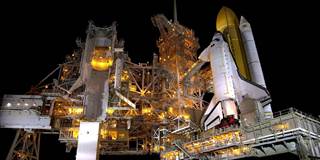Competition for supremacy in outer space is highly dangerous, but with common sense and compromise, competition need not lead to conflict. Unfortunately, in the current wave of competition, only one key player, the US, seems willing to negotiate; the other two, China and Russia, are in no rush to do what is needed.
WASHINGTON, DC – With China, Russia, and the United States fine-tuning anti-satellite (ASAT) warfare capabilities, the third round of competition to “seize the high ground” of space is well underway. This round is distinctive, because it has three contestants, whereas the first and second rounds, which occurred during the Cold War, had only two. But, like its predecessors, today’s space race poses the risks of quick escalation and intensification of conflict among major powers. A set of common-sense rules could help defuse and prevent conflict in space. Unfortunately, Russia and China seem uninterested in negotiating a code of conduct for responsible space-faring countries.
The first space race began in 1957, when the Soviet Union launched Sputnik, the first artificial Earth satellite. US President Dwight Eisenhower’s administration opted to leave Sputnik and its successors alone, recognizing that the US could outpace Soviet space programs and had more to gain from not destroying them.
Eisenhower’s successor, John F. Kennedy, arrived at the same conclusion. But he went a step further, joining with the Soviet Union to champion a United Nations resolution on cooperation in space. Kennedy’s eyes had been opened by a July 1962 US atmospheric nuclear test that inadvertently destroyed at least six satellites, including some belonging to the USSR. A few months later, the Cuban missile crisis spurred agreement on a ban on atmospheric testing. In 1967, US President Lyndon Johnson and Soviet leader Leonid Brezhnev turned UN resolutions into the Outer Space Treaty, which marked the end of the first military space competition.



WASHINGTON, DC – With China, Russia, and the United States fine-tuning anti-satellite (ASAT) warfare capabilities, the third round of competition to “seize the high ground” of space is well underway. This round is distinctive, because it has three contestants, whereas the first and second rounds, which occurred during the Cold War, had only two. But, like its predecessors, today’s space race poses the risks of quick escalation and intensification of conflict among major powers. A set of common-sense rules could help defuse and prevent conflict in space. Unfortunately, Russia and China seem uninterested in negotiating a code of conduct for responsible space-faring countries.
The first space race began in 1957, when the Soviet Union launched Sputnik, the first artificial Earth satellite. US President Dwight Eisenhower’s administration opted to leave Sputnik and its successors alone, recognizing that the US could outpace Soviet space programs and had more to gain from not destroying them.
Eisenhower’s successor, John F. Kennedy, arrived at the same conclusion. But he went a step further, joining with the Soviet Union to champion a United Nations resolution on cooperation in space. Kennedy’s eyes had been opened by a July 1962 US atmospheric nuclear test that inadvertently destroyed at least six satellites, including some belonging to the USSR. A few months later, the Cuban missile crisis spurred agreement on a ban on atmospheric testing. In 1967, US President Lyndon Johnson and Soviet leader Leonid Brezhnev turned UN resolutions into the Outer Space Treaty, which marked the end of the first military space competition.